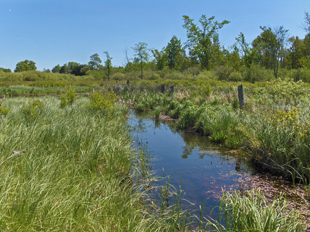The total watershed area is 48 km² or 4,792 ha and the total watercourse length is 67 km.
Staples River
The Staples River is a notable watercourse located southwest of Balsam Lake in the Kawartha region. Originating near the intersection of Glenarm and Kirkfield roads, the river flows northward into Balsam Lake, contributing to the lake's hydrology and ecological diversity.
The Staples River watershed encompasses approximately 48 square kilometers, featuring a total watercourse length of 67 kilometers. The landscape is characterized by 33% natural vegetation cover, predominantly mixed forests. This includes 228 hectares of forest interior and 19 hectares of deep forest interior, providing essential habitats for various plant and animal species.
Significant ecological features within the watershed include several Provincially Significant Wetlands, such as Balsam Lake 01 (367 hectares), Balsam Lake 07 Complex (100 hectares), Balsam Lake South Bay No.42 (10 hectares), and Staples Creek (34 hectares). Additionally, Areas of Natural and Scientific Interest (ANSI) like the Cobourg Hill No.1 Railway Cut (0.52 hectares) and Cobourg Hill No. Middle Road Cut (0.76 hectares) highlight the region's ecological importance.
Environmental assessments indicate that the surface water quality of the Staples River is rated as fair, with total phosphorus concentrations averaging 0.031 mg/L, slightly exceeding the provincial objective of 0.03 mg/L for rivers and streams. The health of benthic macroinvertebrate communities, as measured by the Family Biotic Index (FBI), is considered fair. Forest conditions within the watershed are rated as poor, reflecting the need for conservation efforts to enhance the area's natural environment.
Understanding the characteristics and environmental conditions of the Staples River is essential for effective watershed management and conservation initiatives, ensuring the preservation of its ecological integrity and the health of the broader Balsam Lake ecosystem.

Watershed characteristics
Learn about the characteristics of the Staples River watershed.
The dominant forest type is mixed forest including:
- Forest interior (100 m): 228 ha
- Forest interior (200 m): 19 ha
- Natural cover: 33 %
Provincially Significant Wetlands
- Balsam Lake 01: 367 ha
- Balsam Lake 07 Complex: 100 ha
- Balsam Lake South Bay No.42: 10 ha
- Staples Creek: 34 ha
Area of Natural and Scientific Interest (ANSI) - Earth Science
- Cobourg Hill No.1 Railway Cut: 0.52 ha
- Cobourg Hill No. Middle Road Cut: 0.76 ha
Environmental conditions
The following grades show the environmental conditions for the Staples River watershed.
| Indicator | Result | Grade | Status |
|
Total phosphorus |
0.031 mg/L |
C |
Fair |
|
Benthic macroinvertebrates |
5.23 (FBI) |
C |
Fair |
The surface water quality grade was based on total phosphorous (TP) and/or benthic macroinvertebrates (aquatic insects) family biotic index (FBI). The provincial water quality objective for TP in rivers and streams is 0.03 mg/L and 0.02 mg/L in lakes. These guidelines were set because levels highter than these guildelines provide conditions for nuisance algae and aquatic plant growth. A TP value below 0.03 mg/L (rivers) or 0.02 (lakes) meets the provincial guidelines and is in the B (good) or A (excellent) grade range, while the result for benthic macroinvertebrates must be 5.00 or lower to receive a B (good) or A (very good to excellent) grade.
| Indicator | Area cover | Percent cover | Grade | Status |
|
Forest cover |
10.4 km² |
21.6% |
C |
Fair |
|
Forest interior |
2.3 km² |
4.8% |
D |
Poor |
|
Forest riparian cover |
1.4 km² |
35.0% |
C |
Fair |
The combined forest conditions grade for Staples River is ranked as poor.
| Indicator | Area cover | Percent cover | Grade | Status |
|
Wetland cover |
7.4 km² |
15.5% |
A |
Excellent |
Contact Us
Kawartha Conservation
277 Kenrei Road
Lindsay, ON K9V 4R1
Tel: 705.328.2271
Fax: 705.328.2286
Subscribe to Receive Updates and Notifications
Stay up to date on flood and low water, news, activities, events, programs and operations by subscribing to updates and the Watershed Watch Newsletter.
